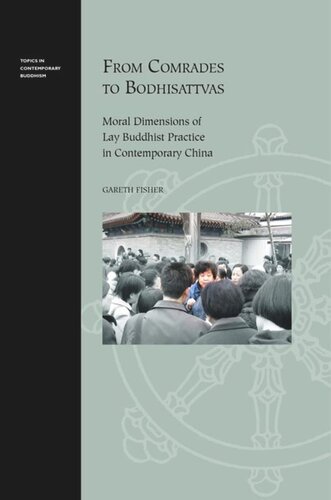

Most ebook files are in PDF format, so you can easily read them using various software such as Foxit Reader or directly on the Google Chrome browser.
Some ebook files are released by publishers in other formats such as .awz, .mobi, .epub, .fb2, etc. You may need to install specific software to read these formats on mobile/PC, such as Calibre.
Please read the tutorial at this link: https://ebookbell.com/faq
We offer FREE conversion to the popular formats you request; however, this may take some time. Therefore, right after payment, please email us, and we will try to provide the service as quickly as possible.
For some exceptional file formats or broken links (if any), please refrain from opening any disputes. Instead, email us first, and we will try to assist within a maximum of 6 hours.
EbookBell Team

4.4
82 reviewsFrom Comrades to Bodhisattvas is the first book-length study of Han Chinese Buddhism in post-Mao China. Using an ethnographic approach supported by over a decade of field research, it provides an intimate portrait of lay Buddhist practitioners in Beijing who have recently embraced a religion that they were once socialized to see as harmful superstition. The book focuses on the lively discourses and debates that take place among these new practitioners in an unused courtyard of a Beijing temple. In this non-monastic space, which shrinks each year as the temple authorities expand their commercial activities, laypersons gather to distribute and exchange Buddhist-themed media, listen to the fiery sermons of charismatic preachers, and seek solutions to personal moral crises. Applying recent theories in the anthropology of morality and ethics, Gareth Fisher argues that the practitioners are attracted to the courtyard as a place where they can find ethical resources to re-make both themselves and others in a rapidly changing nation that they believe lacks a coherent moral direction. Spurred on by the lessons of the preachers and the stories in the media they share, these courtyard practitioners inventively combine moral elements from China’s recent Maoist past with Buddhist teachings on the workings of karma and the importance of universal compassion. Their aim is to articulate a moral antidote to what they see as blind obsession with consumption and wealth accumulation among twenty-first century Chinese. Often socially marginalized and sidelined from meaningful roles in China’s new economy, these former communist comrades look to their new moral roles along a bodhisattva path to rebuild their self-worth.
Each chapter focuses on a central trope in the courtyard practitioners’ projects to form new moral identities. The Chinese government’s restrictions on the spread of religious teachings in urban areas curtail these practitioners' ability to insert their moral visions into an emerging public sphere. Nevertheless, they succeed, at least partially, Fisher argues, in creating their own discursive space characterized by a morality of concern for fellow humans and animals and a recognition of the organizational abilities and pedagogical talents of its members that are unacknowledged in society at large. Moreover, as the later chapters of the book discuss, by writing, copying, and distributing Buddhist-themed materials, the practitioners participate in creating a religious network of fellow-Buddhists across the country, thereby forming a counter-cultural community within contemporary urban China.
Highly readable and full of engaging descriptions of the real lives of practicing lay Buddhists in contemporary China, From Comrades to Bodhisattvas will interest specialists in Chinese Buddhism, anthropologists of contemporary Asia, and all scholars interested in the relationship between religion and cultural change.